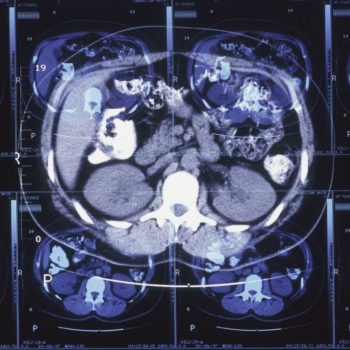Scientists say they've come up with a way to use existing MRI technology to accurately pinpoint who will get dementia over the next two and a half years.
Nailing down a dementia diagnosis is difficult. First, the person with the suspected disease needs to ask their doctor about cognitive testing—easier said than done in some cases. After going through with the testing, close friends or family members need to be interviewed. Then, to really confirm a diagnosis, the patient can get cerebrospinal fluid drawn or a PET scan.
Most patients never get to the final step, though. Those tests are expensive and not covered by insurance because dementia is considered an incurable disease. But studies show that getting a diagnosis early—in some cases, signs of dementia show up in the brain years before symptoms—leads to a better quality of life for the person with dementia and less money spent during the course of the disease. Finding out if you have the beta-amyloid plaques and tau tangles, two proteins that characterize the disease, could get you into a clinical trial that offers a therapy.
Now, scientists have come up with a way to use existing MRI technology to accurately pinpoint who will get dementia over the next two and a half years. Washington University School of Medicine in St. Louis found that an MRI could predict which patients get dementia with an 89 to 95 percent accuracy rate.
“Right now it’s hard to say whether an older person with normal cognition or mild cognitive impairment is likely to develop dementia,” said lead author Cyrus A. Raji, M.D., Ph.D., an assistant professor of radiology at Washington University’s Mallinckrodt Institute of Radiology. “We showed that a single MRI scan can predict dementia on average 2.6 years before memory loss is clinically detectable, which could help doctors advise and care for their patients.”
Neurologists typically rely on a test called the Mini-Mental State Exam to diagnose Alzheimer’s. They can also test for the ApoE4 gene, which increases the risk of Alzheimer’s by 12-fold for patients who carry three copies (though it’s not a predictor of the disease). They did those tests on patients in this study, and they proved to be about 70 to 80 percent accurate.
To test whether an MRI could measure the risk of Alzheimer’s, scientists used something called diffusion tensor imaging, which measures the brain’s white matter. White matter can be thought of as the operator of the brain, letting different regions talk to one another.
“Diffusion tensor imaging is a way of measuring the movement of water molecules along white matter tracts,” Raji said. “If water molecules are not moving normally it suggests underlying damage to white tracts that can underlie problems with cognition.”
People with cognitive decline in the study had more white matter damage than their counterparts. Looking at the whole brain, the accuracy of the prediction was 89 percent. But when the researchers zeroed in on certain parts of the brain, the accuracy was 95 percent.
“We could tell that the individuals who went on to develop dementia have these differences on diffusion MRI, compared with scans of cognitively normal people whose memory and thinking skills remained intact,” Raji said. “What we need now, before we can bring it into the clinic, is to get more control subjects and develop computerized tools that can more reliably compare individual patients’ scans to a baseline normal standard. With that, doctors might soon be able to tell people whether they are likely to have Alzheimer’s develop in the next few years.”
The study was small—only 20 people were involved in the first phase and 61 in the second—but the results are promising. And while there is no treatment that can slow down or stop Alzheimer’s, having two and half more years to grapple with an Alzheimer’s diagnosis could give people the opportunity to take more of a role in their treatment plan, make lifestyle changes that could positively impact their health and allow them to enroll in potentially beneficial clinical trials.





That’s crazy that 2.6 years before memory loss is detectable an MRI can detect dementia. My family has a history of memory loss. I’ll have to look into MRIs further.
BasedOn the scary Fact that my dads side all had Alzheimer’s going back forever. Dad gave each generation one of his 2 Apoe4. Not only do I have one of his genes my children all have an Apoe4 & my grandchildren also. So if anyone thinks this is not something That’s worth a cure than ask a family member from any Of my generationS how we feel? We r so terrified some won’t speak about it & some talk about suicide. Me I cry knowing my children & Grand children will die from this terrible long damaging disease. Yes my grandparents ea gave my dad a Apoe4 for him to end up w/2, in case most of u don’t know how this works. The worst part is so many ways to test but not 1 dr is using testing for those who want to know. Let us b tested so we can plan r lives.